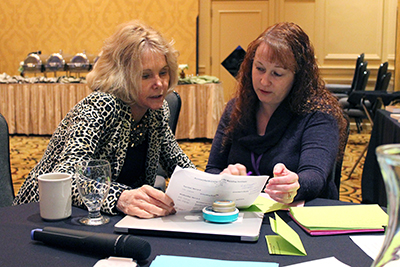CBI Agenda

Tuesday, March 8
7:00 – 9:00 pm
Networking Reception
Wednesday, March 9
8:00 – 9:00 am
Breakfast and Networking
9:00 – 9:45
Welcome, Introductions, and Goals
Sheryl Burgstahler, AccessCyberlearning PI, DO-IT Director
Video – IT Accessibility: What Campus Leaders Have to Say
9:45 – 10:45
Engagement of People with Disabilities in Computing Fields and Development of New Technologies
Richard Ladner, AccessComputing and AccessCSForAll PI; Professor in Computer Science & Engineering, University of Washington
11:00 – 11:45
Web Accessibility
Terrill Thompson, DO-IT Technology Accessibility Specialist
12:00 – 1:00
Lunch and Discussion
What challenges does your project face related to accessibility to individuals with disabilities? Make notes on flip charts & record sheets before the end of lunch.
1:00 – 1:30
Report Out
1:30 – 2:15
Document Accessibility
Dan Comden, Manager Access Technology Center
2:30 – 3:40
Approaches to Access: Accommodations and Universal Design
Sheryl Burgstahler
Video on Benefits of Universal Design Practices for Students
3:45 – 4:45
Panel On Diverse Student Needs, Research, Tools
Panelists lead discussion on (1) relevant research in diverse fields (e.g., learning design for science education, the psychology, of reading and writing, and natural language processing) should inform the creation of the next generation of cyberlearning tools; and (2) tools and strategies not designed for people with disabilities that hold promise for addressing diverse student needs.
Panel Members: Becky Passonneau, CAP: Advancing Technology and Practice for Learning Reading and Writing Skills in Secondary Science Education; Prasun Dewan, EAGER: Automatic Classification of Programming Difficulties by Mining Programming Events; Ina Wanca, Cyberlearning Workforce Readiness
4:45 – 5:00
Preview of Dinner Tonight and Tomorrow’s Topics Complete Daily Feedback Form
6:00 – 8:00
Dinner, Governor’s Room
Discussion: What steps will you take to overcome accessibility barriers identified during the lunch discussion? Write your responses on form provided.
Thursday, March 10
8:00 – 9:00 am
Breakfast and Networking
9:00 – 10:25
Daily Overview
Panel On Assessment of Student Learning and Maximizing Student Engagement: Panelists lead discussion on (1) how technology can best adjust instruction to learning challenges and ultimately assess the learning of all students, including those with disabilities, and (2) strategies that can maximize the engagement of students who might not typically engage in cyberlearning.
Panel Members: April Marie Leach, Cyber Literacy Learning for Social Transformation; Katie Rich, Number Stories; Beverly Woolf, The impact of Learning Companions on Students with Learning Disabilities; Aaron Kline, Autism Glass: Design Challenges and Strategies for Targeted Audiences
10:25 – 10:40
Video – Part of Me, Not All of Me
11:00 – 12:00
Accessible Online Learning: What Instructors Need to Know and Experiences of Online Instructors
Sheryl Burgstahler, Hadi Rangin
12:00 – 1:00
Lunch and Discussion
How can your project design cyberlearning products and pedagogy accessible to people with disabilities? Make notes on flip charts & record sheets before the end of lunch.
1:00 – 2:30
Panel Soliciting Student Perspectives: Students with disabilities share their experiences and recommendations regarding access and engagement online.
Report Out from Lunch Discussion, with Consideration of Panelist Comments
Video – Captions: Improving Access to Postsecondary Education
2:30 – 4:45
AccessCyberlearning Products, Activities, and Working Groups
Sheryl Burgstahler
Working Groups: Individually or in groups, (1) draft promising practices, Q&A’s, or case studies for the AccessCyberlearning Knowledge Base; (2) create replication packages; (3) suggest/draft other products that can benefit NSF’s Cyberlearning community; (4) propose activities and initiatives that can increase the accessibility of cyberlearning to people with disabilities.
4:45 – 5:00
Preview of Tomorrow’s Topics
Complete Daily Feedback Form
Friday, March 11
8:00 – 9:00 am
Breakfast and Networking
9:00 – 10:15
Daily Overview and Panel on Lessons Learned and Promising Practices: Panelists lead discussion on (1) how specific challenges of students with disabilities can inform all cyberlearning projects, and (2) promising practices for addressing these challenges.
Panel members: Emily Moore, EM: Inclusively Designed Simulations for Diverse Learners (DRK- 12); Raymond Rose, TxDLA Accessibility Certification Program; Mike Wojan, University of Michigan Digital Innovation Greenhouse
10:15 – 12:00
Break and Continuation of Working Groups
Discussion of Next Steps - Sheryl Burgstahler
12:00 – 1:00
Lunch, Networking and Discussion
How can we continue to work together to promote universally designed cyberlearning?